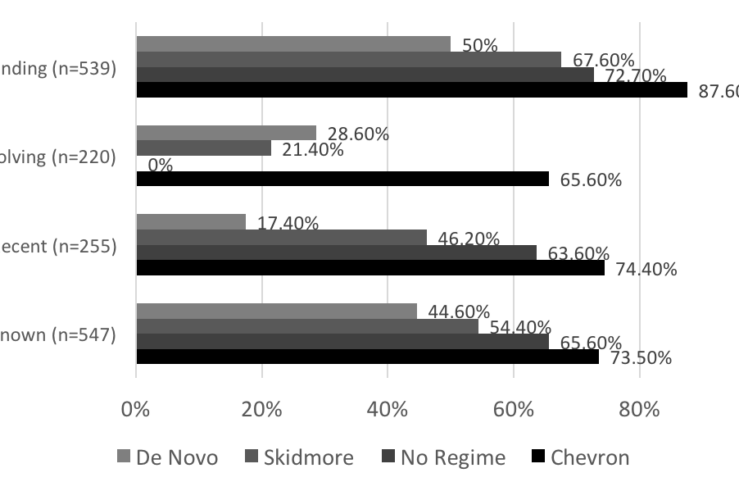Showing archive for: “Administrative Law”
Chevron and the Politicization of Law (or, Chevron Step Three)
A recent exchange between Chris Walker and Philip Hamburger about Walker’s ongoing empirical work on the Chevron doctrine (the idea that judges must defer to reasonable agency interpretations of ambiguous statutes) gives me a long-sought opportunity to discuss what I view as the greatest practical problem with the Chevron doctrine: it increases both politicization and polarization of ... Chevron and the Politicization of Law (or, Chevron Step Three)
The net neutrality CRA may be the most tedious piece of political theater ever
At this point, only the most masochistic and cynical among DC’s policy elite actually desire for the net neutrality conflict to continue. And yet, despite claims that net neutrality principles are critical to protecting consumers, passage of the current Congressional Review Act (“CRA”) disapproval resolution in Congress would undermine consumer protection and promise only to ... The net neutrality CRA may be the most tedious piece of political theater ever
Closing the Rural Digital Divide Requires Understanding the Rural Digital Divide
I had the pleasure last month of hosting the first of a new annual roundtable discussion series on closing the rural digital divide through the University of Nebraska’s Space, Cyber, and Telecom Law Program. The purpose of the roundtable was to convene a diverse group of stakeholders — from farmers to federal regulators; from small ... Closing the Rural Digital Divide Requires Understanding the Rural Digital Divide
ICLE urges Supreme Court to review DC Circuit decision in Open Internet Order case
Today the International Center for Law & Economics (ICLE) submitted an amicus brief urging the Supreme Court to review the DC Circuit’s 2016 decision upholding the FCC’s 2015 Open Internet Order. The brief was authored by Geoffrey A. Manne, Executive Director of ICLE, and Justin (Gus) Hurwitz, Assistant Professor of Law at the University of Nebraska ... ICLE urges Supreme Court to review DC Circuit decision in Open Internet Order case
Congressional Review Act Should Be Used to Strike Down Ill-Advised CFPB Arbitration Rule
On July 10, the Consumer Financial Protection Bureau (CFPB) announced a new rule to ban financial service providers, such as banks or credit card companies, from using mandatory arbitration clauses to deny consumers the opportunity to participate in a class action (“Arbitration Rule”). The Arbitration Rule’s summary explains: First, the final rule prohibits covered providers ... Congressional Review Act Should Be Used to Strike Down Ill-Advised CFPB Arbitration Rule
Targeting Federal Agency Regulatory Overreach through the Congressional Review Act (CRA)
On February 22, 2017, an all-star panel at the Heritage Foundation discussed “Reawakening the Congressional Review Act” – a statute which gives Congress sixty legislative days to disapprove a proposed federal rule (subject to presidential veto), under an expedited review process not subject to Senate filibuster. Until very recently, the CRA was believed to apply ... Targeting Federal Agency Regulatory Overreach through the Congressional Review Act (CRA)
How to Regulate: An Overview
So I’ve just finished writing a book (hence my long hiatus from Truth on the Market). Now that the draft is out of my hands and with the publisher (Cambridge University Press), I figured it’s a good time to rejoin my colleagues here at TOTM. To get back into the swing of things, I’m planning ... How to Regulate: An Overview
A Set-top Box Set-Back and an Opportunity for Good Government
There must have been a great gnashing of teeth in Chairman Wheeler’s office this morning as the FCC announced that it was pulling the Chairman’s latest modifications to the set-top box proposal from its voting agenda. This is surely but a bump in the road for the Chairman; he will undoubtedly press ever onward in ... A Set-top Box Set-Back and an Opportunity for Good Government
Chairman Wheeler’s new set-top box proposal: from unmitigated disaster to plain old disaster
Imagine if you will… that a federal regulatory agency were to decide that the iPhone ecosystem was too constraining and too expensive; that consumers — who had otherwise voted for iPhones with their dollars — were being harmed by the fact that the platform was not “open” enough. Such an agency might resolve (on the ... Chairman Wheeler’s new set-top box proposal: from unmitigated disaster to plain old disaster
Our amicus brief supporting en banc review of the court’s Open Internet Order decision
Last week the International Center for Law & Economics and I filed an amicus brief in the DC Circuit in support of en banc review of the court’s decision to uphold the FCC’s 2015 Open Internet Order. In our previous amicus brief before the panel that initially reviewed the OIO, we argued, among other things, that In order to justify ... Our amicus brief supporting en banc review of the court’s Open Internet Order decision
The FCC’s proposed broadband privacy rules are still devoid of sufficient evidence or analysis
Yesterday, the International Center for Law & Economics filed reply comments in the docket of the FCC’s Broadband Privacy NPRM. ICLE was joined in its comments by the following scholars of law & economics: Babette E. Boliek, Associate Professor of Law, Pepperdine School of Law Adam Candeub, Professor of Law, Michigan State University College of ... The FCC’s proposed broadband privacy rules are still devoid of sufficient evidence or analysis
Trimming the Sails of the Administrative State
In the wake of the recent OIO decision, separation of powers issues should be at the forefront of everyone’s mind. In reaching its decision, the DC Circuit relied upon Chevron to justify its extreme deference to the FCC. The court held, for instance, that Our job is to ensure that an agency has acted “within ... Trimming the Sails of the Administrative State






